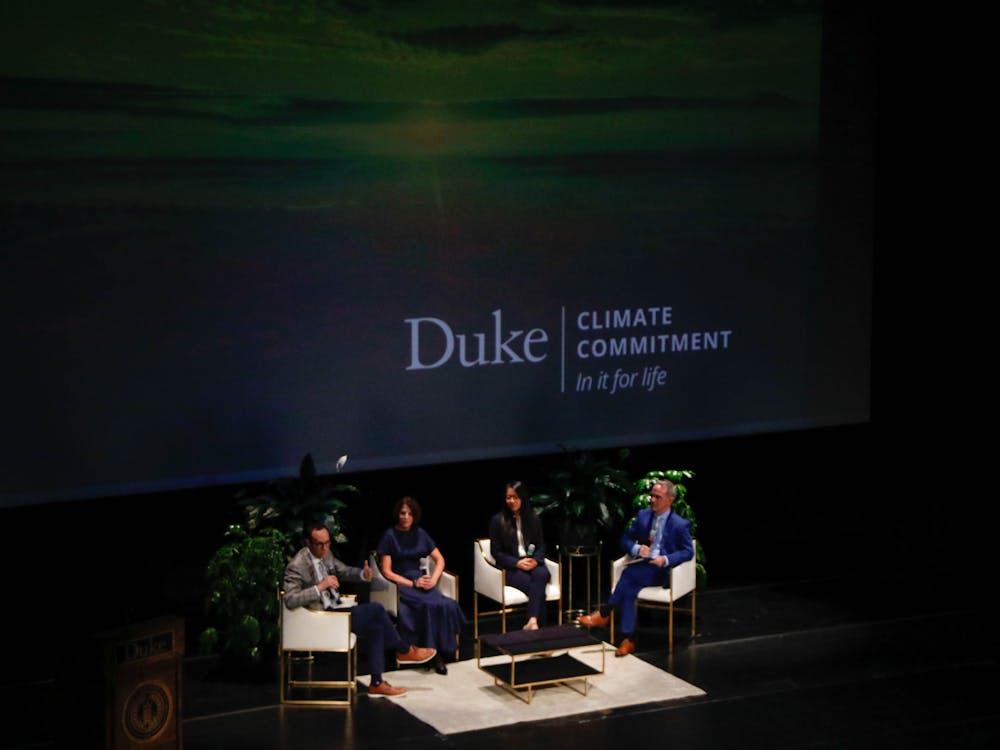Leaders of the Duke Climate Commitment hosted a virtual town hall on Wednesday to answer questions about the commitment and inform students about how they can get involved.
The hosts of the event were Toddi Steelman, Stanback dean of the Nicholas School of the Environment, Brian Murray, interim director of the Nicholas Institute for Energy, Environment and Sustainability and Tavey Capps, executive director of Sustainable Duke.
They led an initial presentation discussing the most important accomplishments and future of the program. The slideshow highlighted that this initiative centers on five core areas: climate education and literacy, climate research, sustainable operations and facilities, community partnerships and external engagement.
One quantifiable achievement thus far has been that Duke has reduced its carbon footprint by 43% since initial goals were introduced in 2007.
“Duke has done a lot,” Capps said. “The 43% reduction in emissions is despite a three million gross square feet increase in square footage at the campus. We expect by 2024, we will reduce our emissions on campus by about 70%.”
Capps was asked about how Duke plans to reach this goal. She mentioned off-campus solar investment, potential for renewable natural gas in the campus steam plants, and energy efficiency as a few tools the University can use. Capps also discussed the possibility of increasing electric vehicle infrastructure for campus transportation and charging stations.
Duke’s investment programs have come under criticism as students have called for the University to divest from fossil fuels. Murray clarified the separation between the Climate Commitment team and investment responsibilities. Duke Management Company (DUMAC) is the group in charge of Duke’s investment portfolio and they report to the Board of Trustees for investment decisions.
“The Board of Trustees issued a statement on climate change and investment requiring DUMAC to take the grave threat of climate change and the opportunity for green investments into the management decisions for the endowment,” Murray said. “The Board of Trustees will be receiving periodic reports from DUMAC to monitor the exercise of sound environmental stewardship.”
The Advisory Committee on Investment Responsibility is a coalition of professors and students that can advise the president or the Board about investment decisions. However, Murray noted that they have not recommended a complete divestment from fossil fuels.
Murray suggested the ACIR as a possible avenue for student involvement regarding endowment-related concerns specifically.
“You should, as a student, be communicating your concerns directly to the ACIR, through both the public forum and through representation by your graduate students,” he said.
Duke students have also demanded more input in the Climate Commitment, and this issue was addressed in the town hall. Steelman admitted that there need to be improved methods for students and faculty to contribute to the conversation on the Climate Commitment. She offered some possible solutions for improvement, particularly by expanding existing networks, while also introducing better channels of communication.
She pointed to the campus sustainability committee as one of the ways that the Climate Commitment incorporates student voices, and mentioned the possibility of restructuring this committee.
A popular question centered around the cooperation between Duke and the greater Durham community, and the prospects for education on environmental justice.
“I'll start by saying that the Climate Commitment is working in partnership with Durham Community Affairs on these issues,” Murray said.
He also highlighted possible dangers of collaboration.
“There's a risk that everyone's going to start flying into the community to fix things and those efforts require great care,” Murray said. “[Durham’s sustainability efforts] are very bottom-up oriented rather than top-down, and there's a lot of exciting things going on. We want to be mindful of the experts in our community who work with community partnerships to take the time to get it right. ”
According to Steelman, the Nicholas School for the Environment has a masters concentration in Community Engagement and Environmental Justice and Duke will be hiring an environmental justice professor. Murray highlighted the Environmental Justice Lab, the Human Rights Institute and the Kenan Center for Ethics as doing important research and community engagement with the issue.
Concrete plans for the future are largely uncertain, and the leaders of the Climate Commitment want to ensure that these plans are constructed carefully. Throughout the town hall, speakers emphasized that the commitment is in its early stages and there is still a long way to go.
“It's not something that's going to happen tomorrow and be done,” Steelman said. “It's something that we're committing to over a very long time.”
Get The Chronicle straight to your inbox
Sign up for our weekly newsletter. Cancel at any time.

Ranjan Jindal is a Trinity junior and sports editor of The Chronicle's 120th volume.

